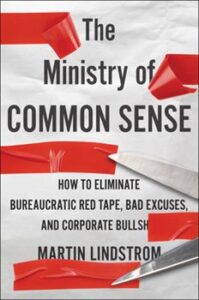Podcast: Play in new window | Download
 Time Magazine named Martin Lindstrom one of the “World’s 100 Most Influential People – and “Thinkers50” named him one of world’s top 20 business thinkers. He’s the author of 7 New York Times best-selling books including his newest, “The Ministry Of Common Sense.”
Time Magazine named Martin Lindstrom one of the “World’s 100 Most Influential People – and “Thinkers50” named him one of world’s top 20 business thinkers. He’s the author of 7 New York Times best-selling books including his newest, “The Ministry Of Common Sense.”
Lindstrom runs one of the world’s leading brand & culture transformation companies – serving a “Who’s Who” list of organizations – & has from a rather young age, learned to see the world from the inside out, rather than the inverse. And as you’ll quickly notice, it’s made him extremely incisive in recognizing how often companies & their leaders take actions that literally make no sense.
*** In the COVID era, we schedule ZOOM calls to last exactly 60 minutes giving people zero time between meetings.
*** In the U.S., TSA allowed passengers to board planes with unlimited amounts of hand sanitizer while maintaining its 3.4-ounce limit on all other liquids.
*** Supermarkets ask customers for permission to have an employee bag up their groceries ignoring that the very same employees stacked those products on the store shelves earlier in the day.
*** Some companies require employees to go to the office twice a week even when it means people will sit alone in a conference room Zooming with colleagues working from home.
Anyone reading this has been invited to unnecessary ZOOM calls, been cc’d on irrelevant e-mail chains & asked to complete reports & forms that no longer have meaning or value. And according to Lindstrom, the more we become victims of old habits & procedures like these ourselves, we suppress our instinctual empathy and overlook all the things we know are wrong & needing a remedy.
Lindstrom believes our constant use of technology has weakened our ability to step into another person’s shoes – or even to care about how other people experience the decisions we make. And this inclination is harming both customer happiness & employee happiness.
Listen in to the remarkable stories Lindstrom shares about how he learned to see the world in ways most of us don’t. And listen in to hear his compelling guidance on we can restore both empathy and common sense in our organizations. His brilliance as a thought-leader shines through the entire discussion.




